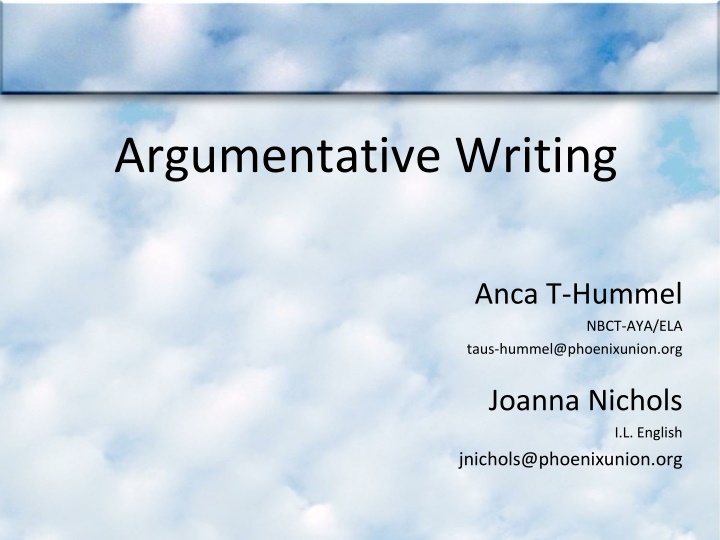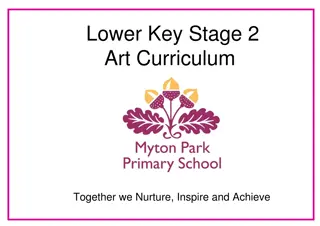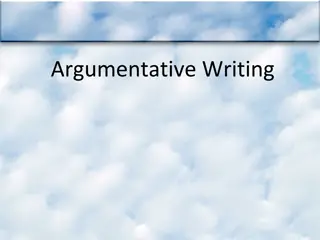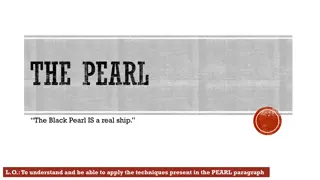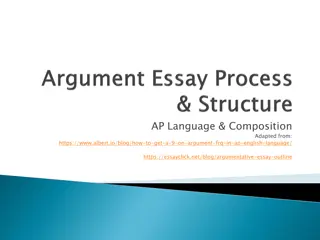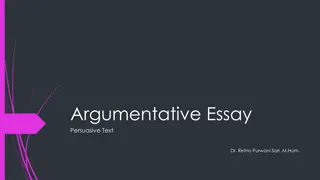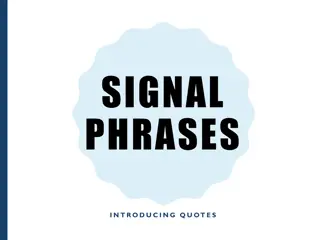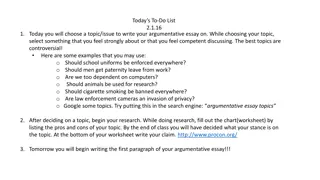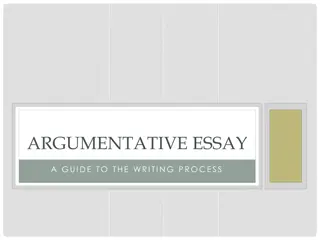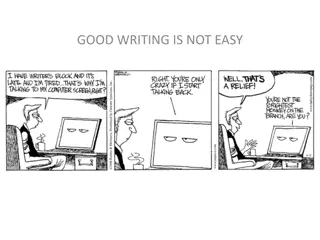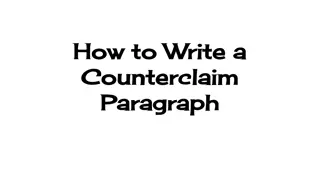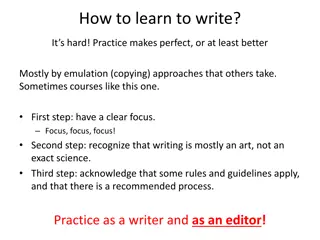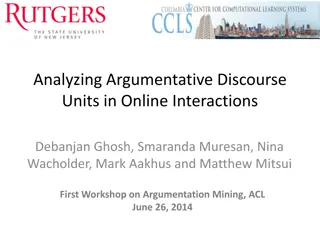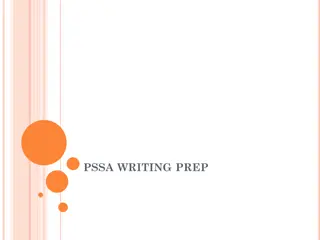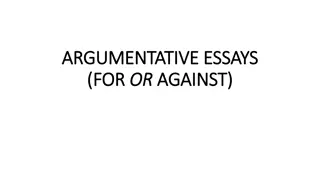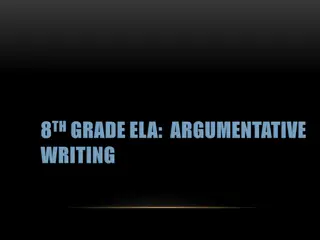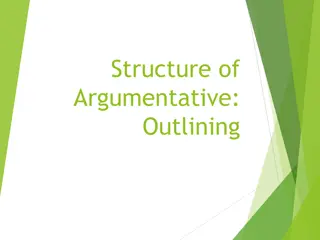Mastering the Art of Argumentative Writing
Argumentative writing entails investigating a topic, evaluating evidence, and establishing a concise position. This type of essay requires a solid claim supported by logical reasoning and factual evidence. Learn the key components, the difference between persuasion and argumentation, and how to craft a strong argument that convinces through logic and merit.
Download Presentation

Please find below an Image/Link to download the presentation.
The content on the website is provided AS IS for your information and personal use only. It may not be sold, licensed, or shared on other websites without obtaining consent from the author.If you encounter any issues during the download, it is possible that the publisher has removed the file from their server.
You are allowed to download the files provided on this website for personal or commercial use, subject to the condition that they are used lawfully. All files are the property of their respective owners.
The content on the website is provided AS IS for your information and personal use only. It may not be sold, licensed, or shared on other websites without obtaining consent from the author.
E N D
Presentation Transcript
Argumentative Writing Anca T-Hummel NBCT-AYA/ELA taus-hummel@phoenixunion.org Joanna Nichols I.L. English jnichols@phoenixunion.org
OPENING EQ: What is argumentative writing and how do I write a good argumentative paper? What are the component parts of a complete, well constructed argument? Standard: RL1: Cite strong and thorough textual evidence 9/27/2024 Free PowerPoint Template from www.brainybetty.com 2
ARGUMENTATIVE ESSAY The argumentative essay is a genre of writing that requires you to: 1. investigate a topic; 2. collect, generate, and evaluate evidence; and 3. establish a position on the topic in a concise manner.
Everyday Life Example When we argue: Bob: That was a lame movie! Suzy: Why? Bob: The special effects were bad. The monsters were obviously fake. Suzy: I thought the movie was good because the acting was believable. Bob s bad response: You are an idiot. Bob s good response: Yes the acting was good but the horrible special effects were too distracting and caused some awkward moments. Claim Evidence Counterclaim Refutation 4
PERSUASION versus ARGUMENTATION Persuasion: The action or fact of persuading someone or of being persuaded to do or believe something. Argumentation: The process of establishing a claim and then proving it with the use of logical reasoning, examples, and research. 5
Difference between Persuasive and Argumentative Essay A persuasive essay An argumentative essay May make a claim based on opinion May not take opposing ideas into account Persuades by appealing to the audience s emotion or by relying on the character or credentials of the writer Makes claims based on factual evidence (research) Makes counterclaims the author takes opposing views into account. Neutralizes or defeats serious opposing ideas Convinces audience through the merit and rationality of the claim and proofs offered Emotion-based Logic-based 6
Elements of Argumentation Argument/Claim An argument states a claim and supports it with reasons and evidence from sources. Arguing your side makes you the proponent. 7
Elements of Argumentation Counterargument/Counterclaim An argument that stands in opposition to your argument/claim. The counterargument is your opponent s(the other side s) argument that tries to explains why you are wrong. 8
Elements of Argumentation Refutation Simply disproving an opposing argument. It is an important skill because it is how a writer successfully convinces the audience of the validity of his/her own argument. 9
The Rhetorical Triangle remember me? Don t forget to incorporate elements of ethos, pathos, and logos. 10
Why is Organization Important in Argument Writing? Guides an audience through your reasoning process Offers a clear explanation of each argued point Demonstrates the credibility of the writer 11
Organizing Your Argument Title Introduction Thesis statement Body Paragraphs Constructing Topic Sentences Building Main Points Countering the Opposition Conclusion 12
WORK SESSION Follow the directions below for Sources 1-4 Write the name of the source. 1.Paraphrase the main idea (write in your own words.) 2.Write the most important quote from your source and 3.Explain why you chose the quote. Complete the outline for your argumentative BOTH ARE DUE TODAY 9/27/2024 Free PowerPoint Template from www.brainybetty.com 13
Practice Look at the Model Argument Essay. Read the title. Turn to your partner and discuss the effectiveness of the title. Be prepared to share. 16
What is an Introduction? Acquaints the reader with the topic and purpose of the paper Generates the audience s interest in the topic Offers a plan for the ensuing argument: Introduction: Tell them what you re going to tell them Body: Tell them Conclusion: Tell them what you told them 17
Methods for Constructing an Introduction personal anecdote example-real or hypothetical question quotation shocking statistics striking image 18
What is a Thesis Statement? The MOST IMPORTANT SENTENCE in your paper Lets the reader know the main idea of the paper Answers the question: What am I trying to prove? Not a factual statement, but a claim that has to be proven throughout the paper 20
Thesis Practice Which thesis statement is the most effective for an argument about the need for V-chips in television sets? Parents, often too busy to watch television shows with their families, can monitor their children s viewing habits with the aid of the V-chip. To help parents monitor their children s viewing habits, the V- chip should be a required feature for television sets sold in the U.S. This paper will describe a V-chip and examine the uses of the V- chip in American-made television sets. 21
Body Paragraphs and Topic Sentences Body paragraphs build upon the claims made in the introductory paragraph(s). Organize with the use of topic sentences that illustrate the main idea of each paragraph. Offering a brief explanation of the history or recent developments of topic within the early body paragraphs can help the audience to become familiarized with your topic and the complexity of the issue. 23
Body Paragraphs Paragraphs may be ordered in several ways, depending upon the topic and purpose of your argument: General to specific information Most important point to least important point Weakest claim to strongest claim 24
Offering a Counterargument Addressing the claims of the opposition is an important component in building a convincing argument. It demonstrates your credibility as a writer you have researched multiple sides of the argument and have come to an informed decision. It shows you have considered other points of view that other points of view are valid and reasonable. 25
Effective Counterarguments Consider your audience when you address the counterargument. Conceding to some of your opposition s concerns can demonstrate respect for their opinions. Remain tactful yet firm. Using rude or deprecating language can cause your audience to reject your position without carefully considering your claims. 26
Placement of a Counterargument Counterarguments may be located at various locations within your body paragraphs. You may choose to: build each of your main points as a contrast to oppositional claims. offer a counterargument after you have articulated your main claims. 27
Research in Body Paragraphs Researched material can aid you in proving the claims of your argument and disproving oppositional claims. Be sure to use your research to support the claims made in your topic sentences make your research work to prove your argument. 29
Conclusion Your conclusion should reemphasize the main points made in your paper. You may choose to reiterate a call to action or speculate on the future of your topic, when appropriate. Avoid raising new claims in your conclusion. Introduction: Tell them what you re going to tell them Body: Tell them Conclusion: Tell them what you told them 30
Recap: Organizing Your Argument Title Introduction Thesis statement Body Paragraphs Constructing Topic Sentences Building Main Points Countering the Opposition Conclusion 31
Key Terms to Learn 1. a person who disagrees with something and speaks against it 2. the act or process of forming reasons, drawing conclusions, and applying them to a case in discussion 3. point or statement that supports one s ideas and/or thesis 4. point or statement in opposition to the argument being made in a written document or speech 5. the process of discrediting the arguments that oppose your thesis statement 6. someone who argues in favor of something; advocate 2 Argumentation ___ 5 Refutation _____ 6 Proponent _____ 1 Opponent _____ 4 Counter Argument (CON) ____ 3 Pro Argument (PRO) _____ 32
Practice Close Read the Model Argument Essay. While marking the text, specifically highlight the Claim Counterarguments/Counterclaims Refutation Does the conclusion meet the requirements? What changes, if any, would you make? 33
Check the web site: http://owl.english.purdue.edu for further info. 34
